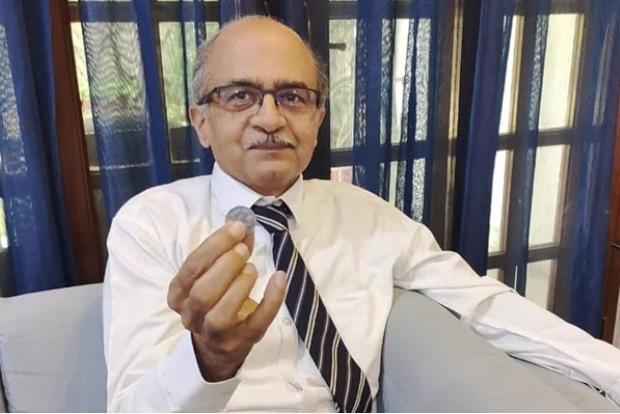Begin typing your search...
Editorial: Order in the courtroom
It was in the backdrop of the debate surrounding NEET which was held on Sunday, that actor Suriya found himself embroiled in controversy after his comments landed him in the crosshairs of a judge of the Madras High Court.

Chennai
The actor pointed out that judges who were dispensing justice using video conference did not have the moral authority to direct students to appear for the NEET in person during COVID. The judge had urged the CJ to initiate contempt proceedings against the actor who had spoken out after five students in Tamil Nadu committed suicide before the examination. However, Suriya received support from as many as six former HC judges who sought the court’s generosity in leaving the matter as it is.
The development comes on the heels of another incident involving SC lawyer Prashant Bhushan who was fined a penalty of Rupee 1 for contempt after he criticised the roles of four former CJs, and called out a CJ for posing on a bike without a mask. To understand if the individuals involved in these cases had truly run foul of the judiciary, one must delve into the country’s history with contempt of court actions. In India, contempt implies that a person has disobeyed a court order (i.e civil contempt), or if he or she has said or done something that scandalises or interferes with judicial proceedings (criminal contempt). In 1961, HN Sanyal, an Additional Solicitor General for the Government, headed a committee that was put together to examine how contempt laws were applied in India. The panel’s recommendations were brought together in the Contempt of Courts Act 1971, which was since amended in 2006 - which permitted courts to punish for contempt only if it obstructed the course of justice.
Tamil Nadu has had an eventful tryst with cases of contempt of court. Two years ago, a BJP leader from the state H Raja was made to apologise to the MHC, which pulled him up for contempt after the politician used unparliamentary words in regard to the police and the judiciary. And earlier in 2015, the MHC judge CS Karnan had made headlines when he took on the then CJI, HL Dattu. Karnan’s bone of contention was the treatment meted out to Dalit judges in the judiciary, for which he declared he would initiate contempt proceedings against the CJI. The Supreme Court, however, initiated contempt proceedings against him and sentenced him to six months in prison.
Setting aside the idea of pulling up a person for having made remarks in a charged atmosphere, lawmakers need to discern between who truly is worth prosecuting and who can be let off with a warning. It is interesting to note that in India, contempt of court is grounds for limiting the right to freedom of speech. It is a caveat that has come under fire from advocates of free speech time and again. In fact in 2011, retired Supreme Court Judge and former chairman of the Press Council of India, Markandeya Katju batted for amendments to the Contempt of Courts Act 1971 and argued that it would offer the media the flexibility for better reportage in matters of law and judiciary.
These recommendations caught the eye of the powers at the Centre, who in a progressive move in 2018, asked the Law Commission to re-examine Section 2 of the Act and the definition of contempt. One of the proposals was to do away with the criminal contempt aspect of the definition (scandalising the court) and retain the idea of civil contempt (disobeying court orders). This makes sense as almost any salvo on the idea of freedom of speech begs the question: are the courts in the country so sensitive about or averse to criticism? And do the courts really have the bandwidth to prosecute anyone with a contrarian viewpoint?
While it is understandable that statements of influential individuals can have a far-reaching impact, it seems vindictive to go after citizens who put forth a challenging perspective. More welcome would be the expedition of cases that require a speedy resolution.
Visit news.dtnext.in to explore our interactive epaper!
Download the DT Next app for more exciting features!
Click here for iOS
Click here for Android
Next Story



